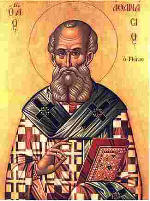
The Paradise Of The Holy Fathers Volumes 1 and 2 by Saint Athanasius Of Alexandria
CHAPTER LI
OF THE BLESSED MAN POSSIDONIUS
NOW the things which [are narrated] concerning the holy man Possidonius the Theban are so many that it is impossible to describe them all; he was so gentle, and gracious, and patient, and enduring, and his soul had so much goodness in it that I do not know that I ever met another man who was like unto him. For I lived with him in Bethlehem for a year, at the time he was living beyond the Monastery of the Shepherds, which was close to the town, and I observed in him many qualities of excellence, of which I will relate [an example of] one or two. He told me one day when I was living by the side of Porphyrites, [saying], “I have not spoken to a man for a whole year, and I have not heard the speech of one. I have not eaten bread, but the insides of palm leaves soaked in water and, whenever I could find it, wild honey. Once, however, the time came when these things failed me, and I was in sore tribulation because of it. And I went forth from the cave that I might go to the habitations of men, and having journeyed on the whole day I was scarcely two miles distant from the cave. And I turned [and looked] behind me, and I saw, as it were, a horseman whose appearance resembled that of a knight, and he had upon his head the similitude of a helmet, and thinking that he was a Roman I turned back to the cave, and I found outside it a basket of grapes and new, ripe figs, and I took them and went with them into the cave rejoicing; and that food sufficed to be a consolation unto me for a period of two months.”
And the blessed man wrought in Bethlehem the following miracle. A certain woman had conceived, and she was possessed of an unclean spirit, and being near to the bringing forth of her child she was greatly afflicted by birth pangs and was violently tortured by that spirit; and as she was writhing by reason of the workings of that devil, her husband came and entreated the holy man to go and pray over her, and we went into [her house] therefore that we might pray together. And having stood up and prayed, after he had knelt down twice he cast out that unclean spirit; when he stood up he said unto us, “Pray ye, for straightway the devil shall go forth.” But there was a certain sign, the fulfilment of which [he wished] to shew us, and therefore when that devil had gone forth, he overturned the whole of the courtyard wall unto its very foundations; now that woman had not spoken a word for a period of about six years, but after that devil had gone forth she brought forth her child and spake.
And, moreover, I also saw [an example] of the prophecy of this blessed man. There was a certain elder, whose name was Hieronymus, who dwelt in these parts, and he was exceedingly well versed in the art and practice of grammar and of eloquence, and he was greatly skilled in the Latin language; but he possessed the vices of envy and evil-eyedness to such a degree that the excellence of his very great skill and ability was entirely hidden. Now the blessed man Possidonius had dwelt with him for many days, and he told me that the free-woman Paula, who had taken care of him, departed from this world before her time in order that she might escape from his envy, and, according to my opinion, it was on account of this man that none of the holy men would live in these districts; and the envy of this man continued to such a degree that it overtook his own brother, which thing took place even as he had foretold. And he also persecuted the blessed man Oxyperentius, who came from Italy, and the wonderful men, Peter the Egyptian and Simeon, who were seen by me. And Possidonius the Great himself told me that for the whole period of forty years he had not tasted food made of bread, and that wrath against any man did not abide with him as long as the half of the day.
Copyright ©1999-2023 Wildfire Fellowship, Inc all rights reserved

 Keep Site Running
Keep Site Running